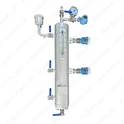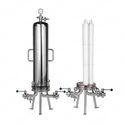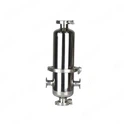A biological fermentation tank is a specialized container where microorganisms are used to convert organic compounds into different chemicals or substances through the process of fermentation. These tanks are a crucial part of the industrial production of various products such as food, beverages, and pharmaceuticals.
In a fermentation tank, microorganisms such as yeast or bacteria are added to a substrate, which is the organic material that will be fermented. The tank is then sealed to maintain the optimal environmental conditions for the microorganisms to thrive. Temperature, pH levels, and oxygen levels are carefully monitored and regulated to ensure that the fermentation process proceeds smoothly.
As the microorganisms consume the substrate, they produce various compounds such as alcohol, lactic acid, and acetic acid. These compounds are then extracted from the fermentation tank and further processed to obtain the desired product.
Biological fermentation tanks have many advantages over traditional chemical processes. They require minimal energy input, produce less waste, and are more environmentally friendly overall. Additionally, the use of microorganisms can often produce higher quality products with more desirable characteristics.
In conclusion, biological fermentation tanks are an essential component of modern industrial production. They represent a sustainable, efficient, and effective way to produce a wide variety of valuable products, contributing to the betterment of human life and society.





